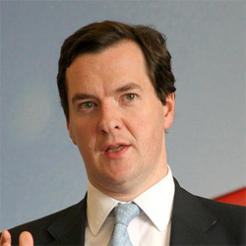George Osborne, the Chancellor of the Exchequer, has been criticised for having an outdated view of the sector after he accused charities of being “anti-business” during a speech last week.
Speaking at the Institute of Directors annual convention on Friday, Osborne said: “You have to get out there and put the business argument, because there are plenty of pressure groups, plenty of trade unions and plenty of charities and the like, that will put the counter view.”
But Sir Stuart Etherington, chief executive of NCVO, disagreed with Osborne's view, and said charity and business worked effectively together.
“'The days when charities and businesses were enemies are long gone,” he said. “Charities will always speak up for the people and causes they work for, but many are also working with businesses to find solutions to society's problems together.
"There will be times when there are disagreements, but most businesspeople understand and respect this. We should be celebrating not denigrating the relationship between business and charities."
Nick Bryer, head UK campaigns and policy at Oxfam, told the Guardian that enterprise “is vital to tackling poverty around the world, which is why we help poor people set up their own businesses and access markets, We don’t recognise the divide he draws between the concerns of businesses and charities”.
Lisa Nandy, Labour’s shadow minister for civil society, said: “George Osborne’s remarks were yet another attack from a Coalition that seems to fundamentally misunderstand what the voluntary sector does in Britain."
She accused the chancellor of "trying to create a false divide".
"We have to view this as part of a bigger picture, a long campaign of words and actions that are hostile to civil society, from the lobbying act to the clamp down on the right to use judicial review," she said. "We cannot trust this government to support the voluntary sector."
Criticism of welfare policies
Separately, a number of leading anti-poverty charities, including the Child Poverty Action Group and Gingerbread, also criticised Osborne over his plans for welfare spending, announced at the Conservative Party Conference last week.
Alison Garnham, chief executive of Child Poverty Action Group, said a proposed two-year freeze on working-age benefits is “bad news for working parents struggling on low wages, already coping with rising living costs and previous benefit cuts”.
Several charities based in Scotland also spoke out against the Conservative’s welfare policies in yesterday’s Sunday Herald.
Graeme Brown, director, Shelter Scotland, said: “This latest set of announcements will come as a hammer-blow to individuals and families across Scotland. It's badly judged and we are extremely concerned that thousands of families already living on the edge could be pushed into bigger problems with rent arrears, particularly in the private sector where demand is pushing up the cost of housing.”
Margaret Lynch, director, Citizens Advice Scotland: “The proliferation of foodbanks is a clear indication that we are losing the war on poverty in Scotland. There is something not quite right here. It is hard to understand how a country as rich as Scotland should be struggling to feed its people, but one in every 50 of our clients has to be referred to a local foodbank, and we have had people through our doors who report not having eaten in a week.”
According to the Trussell Trust demand for its emergency food has risen by 400 per cent in Scotland in the last year. Ewan Gurr, Scotland manager at the Trussell Trust said: “As an apolitical charity, it is important for us to highlight the crises men, women and children using our services experience, and encourage elected officials to identify and implement policy that eases that pressure.”










